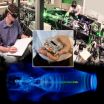(Press-News.org) It's much easier for consumers to justify continued support of a celebrity or politician disgraced by scandal when they separate moral judgments about a public figure from assessments of their professional performance, according to a new study in the Journal of Consumer Research.
"Distinguishing between morality and performance allows consumers to avoid condoning immoral behavior. This may be one reason that the public discourse around scandals often focuses on the relationship between performance and morality rather than how wrong an action is," write authors Amit Bhattacharjee (Dartmouth College), Jonathan Z. Berman, and Americus Reed II (both Wharton School of the University of Pennsylvania).
What do Bill Clinton, Martha Stewart, Tiger Woods, and Roman Polanski have in common? They are all public figures whose reputations have been threatened by scandals attracting relentless media coverage. How do consumers justify buying products endorsed by a celebrity accused of immoral actions or voting for a politician implicated in a scandal?
While some consumers withdraw their support, others may find ways to justify continuing their support either by excusing or justifying the immoral actions in question or separating a judgment of morality about the public figure from an assessment of their performance.
For example, after Tiger Woods admitted to adultery, consumers argued that they don't care for Tiger Woods as a person but still think he is the best golfer in the world and thus will continue to purchase his golf clubs. Instead of arguing that an immoral action is not that severe, consumers prefer to argue that it's not that relevant.
"It may feel wrong to say that immoral actions are acceptable. We don't want to be judged negatively by others for justifying bad behavior. Separating morality from professional standing may be especially appealing, and especially prevalent in public scandals, because it allows us to support an immoral actor without condoning their actions. It's a win-win," the authors conclude.
###Amit Bhattacharjee, Jonathan Z. Berman, and Americus Reed II. "Tip of the Hat, Wag of the Finger: How Moral Decoupling Enables Consumers to Admire and Admonish." Journal of Consumer Research: April 2013. For more information, contact Jonathan Berman (jberm@wharton.upenn.edu) or visit http://ejcr.org/.
Would you buy a product endorsed by Lance Armstrong?
2012-10-22
ELSE PRESS RELEASES FROM THIS DATE:
It's all in the details: Why are some consumers willing to pay more for less information?
2012-10-22
Some consumers will pay more for a product if they are given detailed information on how it works while others are inclined to pay less when given too much detail, according to a new study in the Journal of Consumer Research.
"Certain consumers like to understand how a product works and are willing to pay more when given this information. But others do not want deep explanations and are satisfied by sketchy, abstract knowledge. Asking them to explain how a product works undermines their sense of understanding and makes them less willing to pay for it," write authors Philip ...
In the blink of an eye: Distracted consumers are most likely to remember ads with subtle variations
2012-10-22
Consumers are more likely to remember an ad they've seen repeatedly if one element in the ad changes location from one exposure to the next, according to a new study in the Journal of Consumer Research.
"Consumers are bombarded with thousands of advertisements daily, are increasingly multitasking, and are preoccupied with everyday activities. The likelihood that they will devote their full attention to any one specific message is getting smaller every day. What impact can an ad have if consumers pay virtually no attention to it?" write authors Stewart Shapiro (University ...
Split-personality elliptical galaxy holds a hidden spiral
2012-10-22
Most big galaxies fit into one of two camps: pinwheel-shaped spiral galaxies and blobby elliptical galaxies. Spirals like the Milky Way are hip and happening places, with plenty of gas and dust to birth new stars. Ellipticals are like cosmic retirement villages, full of aging residents in the form of red giant stars. Now, astronomers have discovered that one well-known elliptical has a split personality. Centaurus A is hiding a gassy spiral in its center.
"No other elliptical galaxy is known to have spiral arms," said lead author Daniel Espada (National Astronomical Observatory ...
High quality or poor value: When do consumers make different conclusions about the same product?
2012-10-22
Depending on which naive theory consumers use, a low price can indicate either good value or low quality, whereas a high price may imply either poor value or high quality, according to a new study in the Journal of Consumer Research.
"Consumers rarely have complete information and use various strategies to fill the gaps in their knowledge as they consider and choose products. One of these strategies involves using naive theories: informal, common sense, explanations that consumers use to make sense of their environment. For example, consumers may believe that popular ...
Rewards programs: When do consumers compare experience over value?
2012-10-22
Consumers are often less satisfied when they buy or receive products that are easily counted because this makes them focus on value instead of experience, according to a new study in the Journal of Consumer Research.
"Numbers make us feel more certain of what is in front of us. When we count, we understand exactly how big, expensive, heavy, or old something is. But when we buy or receive products that are easily counted, we may be less satisfied," write authors Jingjing Ma and Neal J. Roese (both Kellogg School of Management, Northwestern University).
What happens when ...
Greater parental stress linked to children's obesity, fast food use and reduced physical activity
2012-10-22
Parents with a higher number of stressors in their lives are more likely to have obese children, according to a new study by pediatric researchers. Furthermore, when parents perceive themselves to be stressed, their children eat fast food more often, compared to children whose parents feel less stressed.
"Stress in parents may be an important risk factor for child obesity and related behaviors," said Elizabeth Prout-Parks, M.D., a physician nutrition specialist at The Children's Hospital of Philadelphia, who led a study published online today in the November issue of ...
Friendship 2.0: Teens' technology use promotes sense of belonging, identity
2012-10-22
With adolescents seemingly glued to cell phones and social networking websites, experts are investigating whether the near-constant digital activity changes youths' development.
A new study from the University of Washington shows that digital media helps teens reach developmental milestones, such as fostering a sense of belonging and sharing personal problems. But the study also raised questions about whether digital connectedness might hinder the development of an autonomous sense of self.
Katie Davis, an assistant professor in the Information School and an expert ...
Breast cancer cells enticed to spread by 'tumorous environment' as well as genetic changes
2012-10-22
A new study from Johns Hopkins researchers suggests that the lethal spread of breast cancer is as dependent on a tumor's protein-rich environment as on genetic changes inside tumor cells.
In a report in the Sept. 25 issue of the Proceedings of the National Academy of Sciences, the scientists conclude that a molecular signal in the protein meshwork surrounding the breast cancer cells may provide the critical trigger to initiate the life-threatening process of metastasis to distant sites in the body.
Moreover, their experiments suggest that the environment surrounding ...
Clue to cause of Alzheimer's dementia found in brain samples
2012-10-22
Researchers at Washington University School of Medicine in St. Louis have found a key difference in the brains of people with Alzheimer's disease and those who are cognitively normal but still have brain plaques that characterize this type of dementia.
"There is a very interesting group of people whose thinking and memory are normal, even late in life, yet their brains are full of amyloid beta plaques that appear to be identical to what's seen in Alzheimer's disease," says David L. Brody, MD, PhD, associate professor of neurology. "How this can occur is a tantalizing ...
State-of-the-art beams from table-top accelerators
2012-10-22
Focusing in on beam focus
The rapidly evolving technology of laser plasma accelerators (LPAs) – called "table-top accelerators" because their length can be measured in centimeters instead of kilometers – promises a new breed of machines, far less expensive and with far less impact on the land and the environment than today's conventional accelerators.
Future LPAs offer not only compact high-energy colliders for fundamental physics but diminutive light sources as well. These will probe chemical reactions, from artificial photosynthesis to "green catalysis"; unique biological ...

